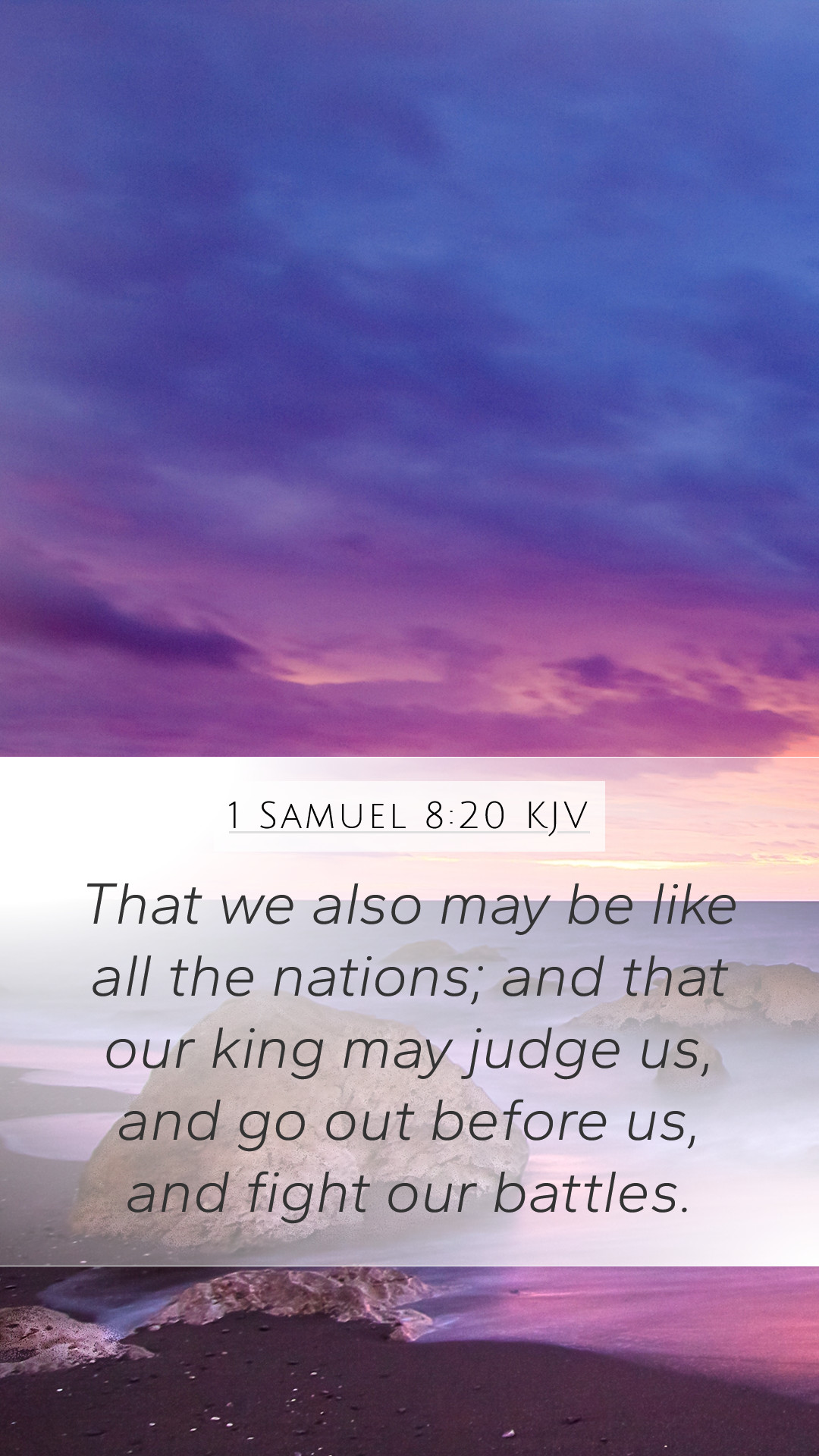Understanding 1 Samuel 8:20
The verse 1 Samuel 8:20 reads:
"That we also may be like all the nations, and that our king may judge us and go out before us, and fight our battles."
This verse captures the plea of the Israelites as they demanded a king to be appointed over them. Their request was not solely for leadership but to conform to the practices of surrounding nations. Below is a detailed commentary that explores the implications, historical context, and theological significance of this verse.
Bible Verse Meanings
1 Samuel 8:20 is significant as it reflects a pivotal moment in Israel's history, transitioning from a theocracy under God’s direct rule to a monarchy. Public domain commentaries provide valuable insights into the intention behind the Israelites' demands:
- Matthew Henry: He emphasizes that the desire for a king stems from their rejection of God's ultimate sovereignty. The Israelites were dissatisfied with God's arrangement and wanted to establish a system like those of the nations around them.
- Albert Barnes: Barnes points out the dangers of desiring to be like other nations. He argues that this desire signifies a lack of trust in God’s provision and leadership, leading to eventual consequences.
- Adam Clarke: Clarke elaborates on the cultural context, noting that the Israelites believed a king would provide security and stability, which they perceived to be lacking in their current system.
Bible Verse Interpretations
The interpretations of this verse vary, but key themes emerge across commentaries:
- Human Desire for Conformity: The Israelites' wish to have a king 'like all the nations' reveals a deep-seated human tendency to conform to social norms rather than uphold divine principles.
- Leadership and Responsibility: The request indicates a misunderstanding of God’s role as the ultimate leader. The Israelites seek a mediator, which foreshadows the imperfect nature of human leadership contrasted with divine guidance.
- Spiritual Implications: Their demanding a king can be seen as a spiritual declension, moving away from dependence on God to reliance on human strength and authority, leading to various social and political ramifications.
Bible Verse Understanding
Understanding this passage requires an awareness of its historical backdrop:
- Historical Context: Israel had been governed by judges, who provided limited authority and were seen as spiritual leaders. As the nation grew and faced external threats, the Israelites felt the need for a more formidable and visible leader.
- Theological Significance: This moment marks the onset of a critical shift in how God's people would operate. It reflects God's permissive will allowing them to have a king, though it was not His ideal for them.
- Lessons for Today: This verse prompts reflection on our own tendencies to seek security in earthly leaders rather than relying on God's guidance in our lives.
Bible Verse Explanations
The explanations of 1 Samuel 8:20 focus on several dimensions of the passage:
- Request for Earthly Rule: By asking for a king, the Israelites express a fundamental desire to have an earthly ruler, which signifies a shift from spiritual leadership to secular governance.
- Expectations of Kingship: They expect this king to lead them, judge them, and fight for them, revealing their longing for protection and authority that they believe only a king could provide.
- Consequences of Their Request: Biblical history shows that their decision would lead to complex challenges, including tyranny and oppression under their kings, which serves as a caution against prioritizing human wisdom over divine direction.
Biblical Exegesis
Engaging in biblical exegesis of this passage involves a close analysis of the text within its literary, historical, and cultural contexts:
- Literary Context: This verse is part of a larger narrative that sets up the eventual anointing of Saul as king, highlighting the shift in governance and its repercussions for Israel.
- Social Context: Understanding the social pressures that influenced the Israelites' demands, including the threat from Philistines and other surrounding nations, is crucial for interpreting this verse.
- Theological Context: This event signifies a moment where Israel's faith in God's leadership wavered, inviting reflection on the implications of such choices in our spiritual journeys.
Applying Bible Verses to Daily Life
Reflecting on 1 Samuel 8:20 can lead to practical applications in daily life:
- Trust in Divine Leadership: The request for a king serves as a reminder to rely on God's direction rather than conforming to societal pressures that may lead us away from His will.
- Discernment in Leadership: When seeking leaders or mentors, prioritize spiritual integrity and guidance rather than mere popularity or secular authority.
- Evaluation of Desires: This verse prompts individuals to evaluate their desires and ambitions. Are they in alignment with God's plans for their lives, or are they seeking validation from worldly standards?
Cross References
1 Samuel 8:20 resonates with various other scriptures that provide additional insights into the nature of leadership and God's sovereignty:
- 1 Samuel 12:12 - This reflects on the people's desire for a king amidst their call to recognize God's kingship.
- Deuteronomy 17:14-20 - This establishes guidelines for Israel's kingship and the expectations of their leaders.
- Luke 22:25-26 - In this New Testament passage, Jesus contrasts earthly authority with servant leadership, emphasizing the nature of true leadership in God's kingdom.


